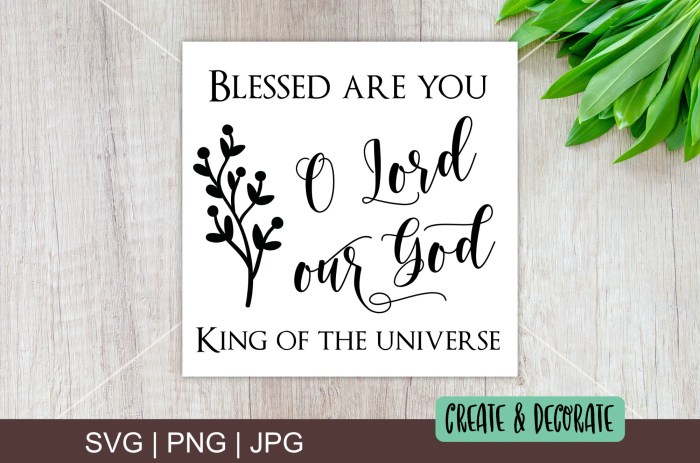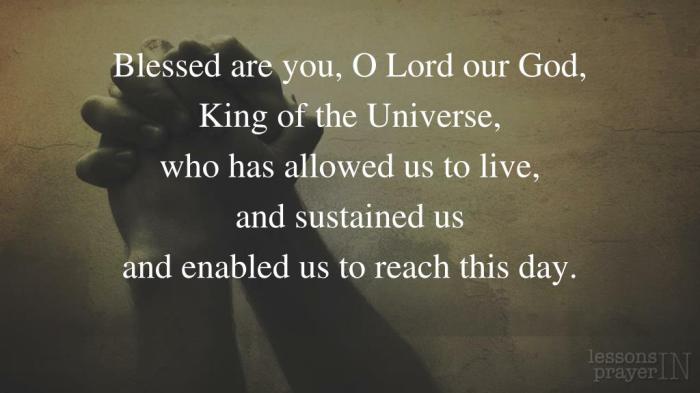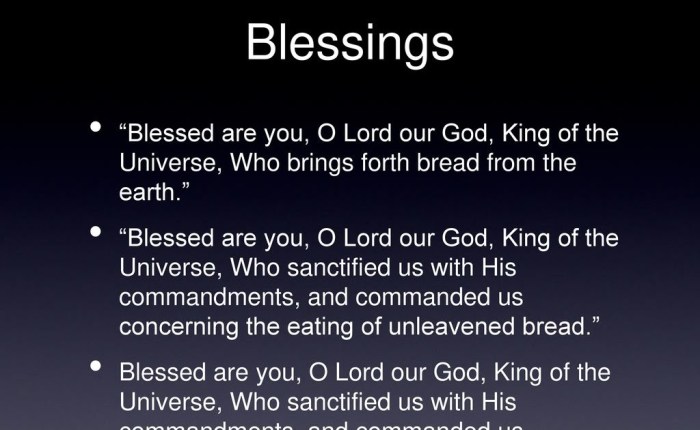Barukh atah adonai eloheinu melekh ha’olam sets the stage for this enthralling narrative, offering readers a glimpse into a story that is rich in detail and brimming with originality from the outset. This phrase, deeply rooted in Jewish tradition and liturgy, serves as a cornerstone of Jewish faith and practice, encapsulating the essence of the Jewish relationship with God.
Throughout this discourse, we will delve into the linguistic intricacies, theological underpinnings, and cultural significance of this revered phrase. We will trace its historical origins, examine its grammatical structure, and explore the profound theological concepts it conveys. Moreover, we will shed light on its role in Jewish rituals, ceremonies, and artistic expressions, demonstrating its enduring impact on Jewish identity and culture.
Introduction to “Barukh Atah Adonai Eloheinu Melekh Ha’olam”

The phrase “Barukh Atah Adonai Eloheinu Melekh Ha’olam” is a central liturgical formula in Judaism, expressing gratitude and praise to God. It translates to “Blessed are You, Lord our God, King of the universe.” This phrase holds profound significance in Jewish religious and cultural life, encapsulating the essence of Jewish worship and the relationship between God and humanity.
Linguistic Analysis
The phrase is composed of several grammatical elements:
- Barukh Atah:A benedictory formula meaning “Blessed are You.”
- Adonai:The primary Hebrew name for God, meaning “Lord.”
- Eloheinu:The possessive form of “Elohim,” meaning “our God.”
- Melekh Ha’olam:“King of the universe,” emphasizing God’s sovereignty over all creation.
The word order follows the typical Semitic pattern of verb-subject-object, with the verb “barukh” (blessed) placed first, followed by the subject “Atah” (You) and the object “Adonai Eloheinu Melekh Ha’olam” (Lord our God, King of the universe).
Theological Implications
The phrase conveys several theological concepts:
- Monotheism:It affirms the existence of one God, the Creator and Sustainer of the universe.
- God’s Sovereignty:The title “Melekh Ha’olam” emphasizes God’s absolute authority and dominion over all.
- Gratitude:The benedictory formula expresses the worshiper’s gratitude for God’s blessings and protection.
- Relationship with God:The phrase establishes a personal connection between the worshiper and God, acknowledging God’s presence and benevolence.
Cultural Significance
The phrase plays a pivotal role in Jewish culture:
- Liturgical Use:It is recited numerous times during daily prayers, serving as a refrain and a reminder of God’s presence.
- Religious Rituals:It is incorporated into various religious ceremonies, including blessings, grace after meals, and the Havdalah service.
- Cultural Symbol:It represents the core beliefs and values of Judaism, fostering a sense of unity and identity among Jewish people.
Literary and Artistic Expressions, Barukh atah adonai eloheinu melekh ha’olam
The phrase has inspired numerous literary and artistic creations:
- Poetry:It has been incorporated into liturgical poems and hymns, such as the Shema and the Aleinu prayer.
- Music:It has been set to music in various liturgical compositions, including the Birkat Hamazon (Grace after Meals) and the Kiddush (blessing over wine).
- Art:It has been inscribed on religious artifacts, such as mezuzahs and ketubot (marriage contracts).
Comparative Analysis
The phrase shares similarities with other expressions in monotheistic religions:
- “Blessed be the Lord my God” (Psalm 144:1):A similar benedictory formula found in the Hebrew Bible.
- “Glory to God in the highest” (Luke 2:14):A Christian hymn expressing praise to God.
- “Allahu Akbar” (God is Great):An Islamic phrase expressing the greatness and sovereignty of God.
While sharing a common theme of gratitude and praise to God, each phrase reflects the unique theological and cultural context of its respective religion.
Detailed FAQs: Barukh Atah Adonai Eloheinu Melekh Ha’olam
What is the meaning of barukh atah adonai eloheinu melekh ha’olam?
Blessed are You, Lord our God, King of the universe.
How is barukh atah adonai eloheinu melekh ha’olam used in Jewish worship?
It is recited at the beginning of many prayers and blessings, and is also used as a response to certain blessings.
What are the theological implications of barukh atah adonai eloheinu melekh ha’olam?
It expresses the Jewish belief in one God who is the creator and sustainer of the universe.


